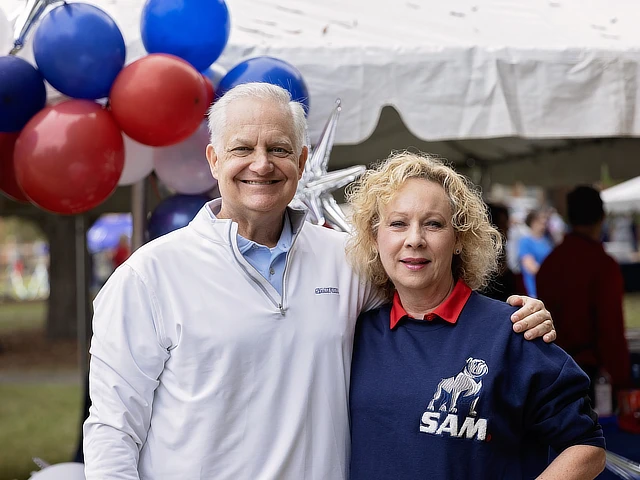
At Samford University’s Orlean Beeson School of Education, mentorship is more than an opportunity for students—it is a philosophy woven into the fabric of the school’s curriculum and pedagogy. Through intentional pairing of experienced educators with aspiring leaders, the school is not only preparing students for the challenges of the profession but also setting a gold standard for professional relationships in higher education.
Bill Cleveland and Jane Cobia, both faculty members in the Department of Educational Leadership, have experienced the profound impact of mentorship as mentees and mentors, and their stories highlight how these relationships are shaping the field of education.
Cleveland credits much of his professional growth to Maurice Persall, a mentor who modeled values that Cleveland now passes on to his own mentees. “Dr. Persall’s influence helped me understand the power of modeling ethical traits such as integrity and honesty,” Cleveland said. “He also emphasized the importance of appreciating diverse learners and learning styles, which I’ve integrated into my own mentorship efforts.”
According to Cleveland, mentorship goes beyond professional development. Rather, it is a reflection of core values and the practical implementation of character education.
“Empowering others through encouragement and sharing my personal relationship with Jesus Christ are ways I aim to embody Samford’s values,” he said. “I’ve witnessed these qualities in my mentors and hope to inspire the same in others.”
This intentional approach to mentorship is evident in Cleveland’s work with Justin Hefner, who rose from a principalship in Pelham to become the superintendent of Homewood City Schools.
“Seeing Dr. Hefner achieve such milestones has been incredibly rewarding,” Cleveland said. “It’s a testament to the ripple effect of strong mentorship.”
Cobia’s experience as a mentee also underscores the lasting impact of mentorship. She attributes much of her success to Ruth Ash, who guided her through pivotal moments in her career.
“Dr. Ash exudes professionalism and compassion,” Cobia said. “She has modeled the best leadership qualities and consistently pushed for innovative actions.”
More than relational, Cobia’s bond with Ash has extended beyond professional development and led to further career aspirations and collaborative opportunity.
“We’ve written a book together, and she’s connected me with influential individuals across Alabama and the nation,” she said. “Her example has inspired me to offer similar support to others.”
In her mentoring work, Cobia has cultivated enduring relationships, including one with Autumm Jeter, assistant superintendent with the Alabama State Department of Education. Though separated by different generations, Ash’s relationship to Cobia, and Cobia’s relationship to Jeter, embodies how effective mentorship can influence one’s career path.
All three leaders began their careers as teachers in the classroom. From there, they all grew into principals, directors of instruction, assistant superintendents, superintendents and ultimately worked in roles in the Alabama State Department of Education.
“Intentional pairing is key,” Cobia said. “Trust, respect and the recognition that our mentors are some of the highest-caliber individuals in the state make these relationships impactful and long-lasting.”
What sets Orlean Beeson School of Education apart is its commitment to embedding mentorship in all aspects of its programs. Cobia highlighted one example of this: a grant-funded initiative from 2015 to 2018 that paired rural, turnaround school principals with one-on-one mentors.
“The relationships built during that time are still active today,” she said. “It’s a model we’ve continued to refine and expand.”
Faith and character are foundational elements of the mentorship culture at Samford. This intentional investment in the lives of its students is one of the reasons The Wall Street Journal ranks Samford University No. 2 in the nation for character development.
“Our mentors live and lead with moral purpose,” Cobia said. “They are firmly grounded in their faith while navigating the complexities of public education. Being a great role model and a good person are what make our mentors exceptional.”
The impact of mentorship extends beyond individual relationships. Cleveland emphasized that mentorship fosters collaboration among educational leaders, creating a ripple effect throughout schools and communities.
“When leaders work collaboratively, they model positive mentorship for faculty, staff and students,” he said. “This culture of collaboration strengthens the entire educational ecosystem.”
The field of education is no stranger to change, but since the COVID-19 pandemic opened eyes to different weaknesses, stresses, demographic shifts, limited resources and the national teacher and leadership shortage, mentorship has never been more vital to ensuring the mental and professional well-being of school and community leaders.
Looking ahead, mentorship at Orlean Beeson School of Education is poised to continue transforming the field of education.
“Having a supportive guide, especially when navigating new environments or cultures, provides comfort and a vital support system,” Cobia said. “This is one way we can ensure the future of education remains strong and innovative.”
Through its intentional approach to mentorship, Samford is empowering students to lead with character, faith and a commitment to lifelong learning. Innovative mentorship relationships continue to inspire a new generation of educators to thrive in an ever-changing world and are ensuring those responsible for the nation’s children and families are thriving in roles where support can often seem limited.
